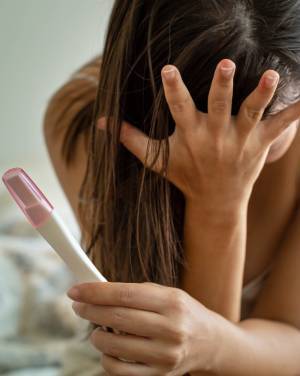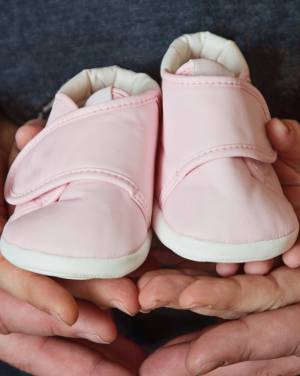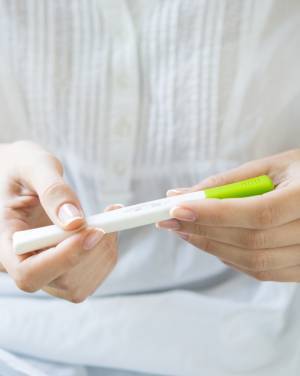Are Stomach or Back Pain and Breast Tenderness Early Pregnancy Symptoms ?
Take the Test: 🤔 Do my symptoms point toward a pregnancy?
- It is common among women to wonder whether their stomach-ache or cramping may indicate a pregnancy. However, their abdominal pain may also announce the imminent onset of their period.
- Could back pain, breast tenderness, or even toothache be an early sign of pregnancy?
- Is pain part of every pregnancy? If so, what kind? What causes this discomfort? Your questions are addressed here.
Do My Symptoms Point Toward a Pregnancy? - Your Self Evaluation
Wondering whether you could be pregnant? Answer three multiple-choice questions about your situation and receive a professional evaluation within seconds on your screen.
Stomach Pain — Am I Pregnant?
ℹ️ Note: If you are experiencing any unusual symptoms or intense pain, especially one-sided abdominal pain, or unexplained bleeding, seek immediate medical attention. These could be caused by an ectopic pregnancy.
Possible Causes of Abdominal Pain:
Pain Before Pregnancy
Ovulation Pain:
Ovulation is an element of the menstrual cycle: An egg cell matures in the follicle and then drops into the fallopian tube. This causes the protective layer around the egg to burst, releasing the egg and follicular fluid. The fimbriae (finger-like projections of the fallopian tube) wrap themselves around the egg, and transport it along the tunnel-like fallopian tube.
This much activity in the abdominal region may cause slight pain (cramping, pressure, twinges), known as “ovulation pain" or “mittelschmerz.” Mittelschmerz means "mid-cycle pain" because it can be felt in the middle of one's menstrual cycle. Some women expect this pain on a monthly basis, while others are unfamiliar with it. However, ovulation can not be pinpointed to that moment of pain. This sensation may also be caused in preparation for ovulation or post-ovulation, while the stretched ovaries shrink to their original size. Still, mittelschmerz is scientifically linked to ovulation and is, therefore, not a sign of pregnancy. Conception cannot take place until after ovulation has occurred.
Pain at the Beginning of Pregnancy
Implantation:
If fertilisation occurs, the zygote will implant in the uterus approximately five days later. This may cause slight pelvic pain and spotting, which would be the first tangible sign of pregnancy.
Events that could possibly trigger abdominal pain will proceed in rapid succession:
- The placenta forms and gradually permeates the uterus with root-like villi.
- Additional blood vessels are formed, ensuring the baby is well-supplied.
- Uterine ligaments, the muscle bands that seat the uterus firmly in the woman's pelvis, expand. This process will likely cause pain in the groin and toward the side of the abdomen.
- Experiencing abdominal pain while missing one's period would cause suspicions of a possible pregnancy.
Gastrointestinal Activity:
Slowed digestion due to hormonal changes may be another possible reason for abdominal pain. Almost half of all pregnant women periodically suffer from stomach pain caused by flatulence or constipation.
Pain During Pregnancy
Less Room for Organs:
As the pregnancy progresses, the baby and the uterus grow, leaving less space for the other organs. This pressure can be painful, as are the noticeable kicks of the baby throughout the last trimester.
Softening of the Pelvis:
The loosening of the pubic bone (symphysis pubis), which connects the two halves of the pelvis, can cause sharp pain. Toward the end of the pregnancy, the gap in the symphysis pubis can loosen by 3 to 4 millimetres (0.15 inches). This movement of the bones, and the associated pain are more pronounced during consecutive pregnancies. A brace or maternity belt may provide relief.
Braxton Hicks Contractions:
After the 20th week of pregnancy, Braxton Hicks contractions can start occurring in increasing frequency. These are practice contractions and are noticeable through a sudden hardening of the abdomen, which can be accompanied by pain.
Tender Breasts — Pregnancy or PMS?
Many women experience breast tenderness before they start their period. This may be a sign that your period is yet to come, only perhaps a little belated. In early pregnancy, the breasts become enlarged due to an increased blood supply and the development of mammary glands. The woman’s body is preparing for possible breastfeeding.
In contrast to breast pain experienced before menstruation, nipples are also affected in a pregnant woman: They protrude more strongly, may darken, and can be tender.
Back Pain at the Onset and During Pregnancy
Hormone-induced loosening of tissue can lead to back pain at the beginning of a pregnancy. This most frequently involves the sacrum and may also impact the sciatic nerve.
The increasing weight and pressure of the baby is also likely to cause sciatic nerve pain during pregnancy. Using a brace may counter this effect.
A 2019 scientific study by Conder et al. showed that an estimated 56% of pregnant women experience back pain at some point during their pregnancy.
Toothache During Pregnancy
Pregnancy hormones cause gums to soften, making them more likely to swell and bleed. Additionally, frequent vomiting results in a higher acidity within the oral cavity. If not countered by vigilant oral hygiene, this could lead to tooth decay and sores.
Other Reasons for Pain During Pregnancy
As the pregnancy progresses, these types of pain are also common:
- Leg cramps due to magnesium deficiency
- Heartburn
- Hemorrhoids
Do you have any questions or concerns? Write your message directly here ⬇️
Pain – Worried About a Possible Pregnancy…
This extensive list need not be cause for concern. Many women experience minimal discomfort during pregnancy. Often, pain is not the tell-tale sign of pregnancy.
🤰To determine whether you are pregnant, purchase a pregnancy test at your local pharmacy. For an initial evaluation, take our Online Pregnancy Test.
You may also like some of our other free online tests:
- 📅 Wondering how far along you are? — Pregnancy Tracker
- ⚖️ Should I Get an Abortion? — Abortion Test
- 💊 When to take Plan B? — Morning-After Pill Test
- 🍷🚬 Tobacco/alcohol/drugs: Has my consumption hurt the baby? — Test
Our Top Picks for You:
FAQs
-
During pregnancy, the female body undergoes changes to nurture the baby. Breast tenderness, experienced by many women, may already begin in early pregnancy. As the breast grows, soreness can occur throughout the breast area. The nipples also change. They become more prominent, darker, and sensitive to touch, to the point of pain. Towards the end of pregnancy, breast tenderness and other changes are often noticeable in preparation for breastfeeding.
-
Breast pain can develop in early pregnancy and just before your period. In both cases, hormonal changes can trigger breast pain. Shortly before your period is due, water retention can lead to a feeling of bloating and tenderness. It is often impossible to distinguish whether these are signs of pregnancy or part of PMS. The onset of your period or a positive pregnancy test will reveal the cause of your breast tenderness.
-
Stomach (abdominal) pain may not necessarily be a sign of pregnancy. Many women experience abdominal cramps in early pregnancy — as the uterus begins to expand and the uterine ligaments stretch — but there are many other possible causes for abdominal pain. If your pain persists, seek medical attention! Should you also be experiencing other signs of pregnancy and miss your period, take a pregnancy test to gain clarity.






